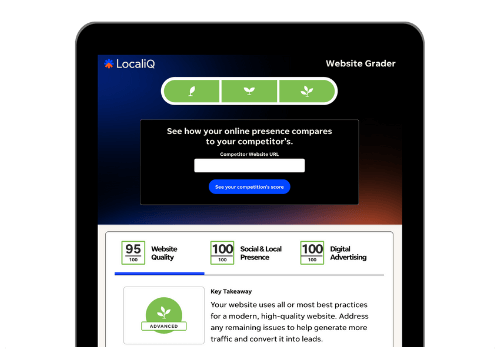Every small and local business owner knows that their competition isn’t limited to fellow small businesses. There are giant brands represented in cities and towns across the country, meaning you’re left to compete with other local shops plus the corporations with big marketing budgets and even bigger name recognition.
These larger companies can easily overshadow small businesses, both physically and in the digital world. But, while it may seem like you’re fighting an uphill battle, there are plenty of advantages that small businesses have over their larger competitors.

So, how do you win when you’re going up against a household name brand? I’ve got 12 small business marketing tips to help you get noticed.
1. Establish a Solid Digital Presence for Your Small Business
With digital marketing, it’s easier than ever for small businesses to create an oversized presence. Getting your name out there used to involve expensive traditional advertising. Today, though, there are many free or low-cost ways to get more customers.
Organic social media marketing is a tremendous way to increase your footprint online, meet consumers where they are on various platforms, and share your business’s unique voice and personality.

Digital marketing approaches like Facebook advertising and pay per click ads provide you the opportunity to reach new audiences for a minimal investment compared to traditional television and radio advertising.
Plus, you can take advantage of those tried and true avenues of marketing, like print ads and direct mail, while using modern data and analytics techniques to find the best audience for these conventional channels.
Most consumers need to see a brand’s name seven times before they even think about doing business with them. So, the more you can get your name out there with local customers, the better shot you have at standing up against the big brand that already has name recognition.
2. Test Out Marketing Trends
Sure, the big brands might have the budget to go all-in on the latest marketing trends, but small businesses have a big benefit here: With a smaller staff and fewer processes in place, you can be more nimble when it comes to your marketing strategy – maybe even test out new trends before the big guys can get their CMO to approve their budget.
Your small business might not have the bandwidth for massive new ideas, but it does have the advantage of executing and iterating quickly — which is the key to getting the results you want.
With less red tape to cut through and a more centralized location to brainstorm, plan, and execute, your small business can actually use innovation for its competitive edge over big businesses.
3. Build Your Business’s Reputation
Being a big business doesn’t necessarily mean being seen as big. There are many large corporations out there that have a mediocre presence across the nation. (Hint: Try Googling reviews for your local big box store – you might be surprised by what you see.)
Alternatively, there are many small businesses out there that have a big name in their community. Being a small business with a well-earned reputation in your surrounding area can be much more rewarding than a larger business that may not enjoy such benefits.
Focus a little time and effort into building up your business’s online reputation by asking for customer feedback, getting more reviews, responding to all reviews, and looking for ways to continue building on your success.
4. Deliver Excellent Customer Service
As a small business owner, you have the ability to develop a deeper, stronger, more personal relationship with your customers. Customer service has just as much value as any product or service you offer. In fact, 90% of people use customer service as a factor when deciding whether or not to do business with a company.
Customers appreciate and pursue relationships and experiences, not just end results. If your customers know you provide a relationship they can’t get at that big business, they’ll come to you first — even if it costs them a little extra.
5. Make Improvements Based on Customer Feedback
If you’re working on creating the best customer experience and managing your online reputation, you may receive constructive feedback from customers on ways your business can improve.

If you’re not proactively receiving this information, you might consider reaching out to some of your loyal customers and asking for their feedback on ways you can improve.
From there, you can implement procedures and processes to improve your business. Maybe your customers want you to add curbside pick-up for your business, or maybe they have similar questions about a service that you can answer on a page on your website.
This shows your customers that you care about their experience and their feedback and sets you apart from the big brands that don’t have the easy ability to tap into customer feedback and make real changes quickly and efficiently.
6. Segment & Refine Your Target Audience
While bigger businesses focus on reaching a broad range of demographics, being a small business gives you the opportunity to reach specific markets more effectively.

The competition may be making purchases and investments based on national or regional sales trends. You, however, have the advantage of knowing what your local customers want most.
Think about different ways you can segment your target audience and the best ways to market to them effectively. This might help you attract even more new customers and grow your audience online.
Tip: Take advantage of lookalike audience targeting on Facebook to show your ads to prospective customers with attributes most similar to your current customers – increasing the likelihood that they would want to do business with your small business.
7. Leverage Branded Content for Your Local Business
Another great way to continue to get your name out in front of local customers is through branded content. Branded content is a fun, creative way to gain attention for your brand, beyond the bounds of traditional advertising. It allows you to tell a story about your business and share your values and mission with your audience.
Start by thinking about the issues that matter most to your customers, then find a great way to link your story up with the things they most care about. The final piece of the puzzle is finding the right digital marketing vehicle for your branded content, which can be anything from a social media campaign to a series of banner ads to drive people to your article, quiz, infographic, and more.
Watch how branded content helped this business owner build trust with prospective customers in his local community:
8. Step Up Your Design
When it comes to branding, people have a tendency to judge a book by its cover. One of the best ways to level the playing field with the big guys is to have professional-looking design elements. A great logo, clean website, and appealing social media assets can help you gain positive attention.
While this may feel daunting for a business owner who doesn’t have a background in design, the digital age and ability to collaborate with skilled designers has made it easier than ever to find skilled professionals who can elevate your brand.

Here’s an example of a local business website with a great design that could easily help them compete with bigger brands.
From helping you select the right color palette (read more on the impact of color in branding in this article) to designing banners, logos, and assets tailored to each social media channel, a good designer with a great digital marketing agency can make a world of difference in how your brand presents itself online. (If you’re looking for help with your site or design assets, check out our web design services.)
9. Create a Customer Loyalty Program
While many big brands have customer loyalty programs or memberships, you can create a customer loyalty program for your small business that gets customers excited about visiting you again and again.
My local donut shop recently added a customer loyalty program, and it makes me excited to keep visiting them so I can get a discount on my future order.

Make sure to play up the local business angle so customers can feel good about supporting a local business and getting something in return.
10. Get Involved in the Community
One of the biggest advantages any local business has over a national brand is the fact that they are local. No, you don’t have the budget or marketing power of the big guy, but you do have that personal connection to your community.
Think about ways to get involved in the local community. Donate products or services to auctions for a nearby school. Get your team together to volunteer monthly or quarterly at a deserving local charity.
Take the time to get to know your neighbors and learn a bit about their personal lives. Create the kind of personal touch that a big brand can only hope to replicate. It’s not digital marketing per se, but word will still get around.
11. Run Local Promotions & Contests
People love a good contest or promotion. Because your small business can easily come up with ideas, promotions, and giveaways without consulting a corporate office, you can develop a regular promotions or contest schedule.
Think about seasonal sales you can run, deals of the day or week, and social media contests to promote your business, engage with your customers, and get more people into your location or calling your business.
12. Attract the Best Employees
Your employees can make or break your business. The better team you have, the better service you can deliver to customers, the easier it is to have a good brand reputation, and the more you can rely on your team to keep things running smoothly even if you’re not always on location.

While big businesses will have more employees and different benefits, think about how you can build a fun, supportive, and attractive culture for your team. Consider perks that the big guys just wouldn’t be able to offer, like team outings, flexible schedules, and more.
Don’t Let Big Brands Swallow Your Business
When you’re a small business fish in the local pond, you’re also swimming with the national brands that have chains nearby. But that doesn’t mean you’re guaranteed to get swallowed up and should not discourage you from bringing your small business ideas to life. When you get smart about your marketing and use your small, local status to your advantage, it’s possible to out-swim even the biggest of fish. Contact us today to learn more.
Here are those 12 ideas for small businesses to compete with big brands:
- Establish a Solid Digital Presence for Your Small Business
- Test Out Marketing Trends
- Build Your Business’s Reputation
- Deliver Excellent Customer Service
- Make Improvements Based on Customer Feedback
- Segment & Refine Your Target Audience
- Leverage Branded Content for Your Local Business
- Step Up Your Design
- Create a Customer Loyalty Program
- Get Involved in the Community
- Run Local Promotions & Contests
- Attract the Best Employees
Related Articles
-

40 A+ Back-to-School Marketing Ideas & Promotions for Any Business
-

35 Back-to-School Slogans for Your Marketing That Bring A+ Results
-

17 Best Giveaway Ideas for Small Businesses to Win More Customers
-

27 Splashy (& Doable!) Grand Opening Ideas for Retail Stores
-

9 Bold Brand Awareness Campaign Examples (+Tips for Yours)


